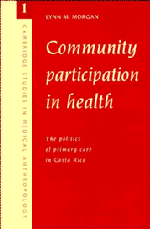Book contents
- Frontmatter
- Contents
- List of illustrations
- List of tables
- Acknowledgments
- List of abbreviations
- 1 The political symbolism of health
- 2 Banana medicine: the United Fruit Company in Costa Rica
- 3 The international imperative: foreign aid for health in Costa Rica
- 4 The primary health care movement and the political ideology of participation in health
- 5 Participation in Costa Rica: dissent within the state
- 6 La Chira: participation in a banana-growing community
- 7 The political economy of participation
- References
- Index
3 - The international imperative: foreign aid for health in Costa Rica
Published online by Cambridge University Press: 29 January 2010
- Frontmatter
- Contents
- List of illustrations
- List of tables
- Acknowledgments
- List of abbreviations
- 1 The political symbolism of health
- 2 Banana medicine: the United Fruit Company in Costa Rica
- 3 The international imperative: foreign aid for health in Costa Rica
- 4 The primary health care movement and the political ideology of participation in health
- 5 Participation in Costa Rica: dissent within the state
- 6 La Chira: participation in a banana-growing community
- 7 The political economy of participation
- References
- Index
Summary
Costa Rica's health system has long been influenced by foreign models of health care. Thus it is essential to analyze the international as well as national context of health service provision. In keeping with the macroanalytic focus begun in the last chapter, I here explore the role of other foreign agencies that influenced the direction of Costa Rican rural health care after the Second World War: the Institute of Inter-American Affairs, the United Nations community development movement, the Inter-American Development Bank, and the United States Agency for International Development's Title IX program. Beginning in the 1940s, these agencies presided over a change in the meaning of health in Latin America, whereby health came to be used in campaigns to support a specifically pro-United States political ideology. It also served as a way of introducing U.S. personnel, technology, and values into the Latin American countryside.
In defense of U.S. strategic interests: the Institute of Inter-American Affairs
International development agencies began to expand their Latin American operations during and after the Second World War, in part to promote hemispheric solidarity in the face of perceived German, Italian, and Japanese threats. It was then that the Office of Inter-American Affairs was established (later the Institute of Inter-American Affairs, which subsequently became the model for the U.S. Agency for International Development) to improve Latin American health and nutrition standards as part of its overall strategy to consolidate ranks against possible military threats. War thus became another reason to justify health work in less-developed countries. Defense of U.S. strategic interests was, in this case, the primary argument for investing U.S. dollars in health and sanitation in Latin America.
- Type
- Chapter
- Information
- Community Participation in HealthThe Politics of Primary Care in Costa Rica, pp. 32 - 61Publisher: Cambridge University PressPrint publication year: 1993



